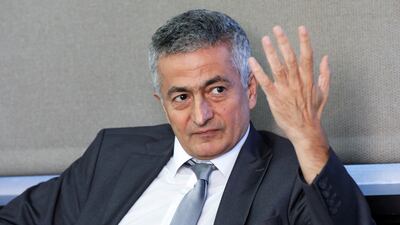Cash-strapped Lebanon plans to bolster state revenue through significant tax and VAT increases in its 2024 budget proposal presented by the Ministry of Finance to the caretaker cabinet.
“What matters most to us is to generate revenue,” caretaker Minister of Finance Youssef Khalil said after a Council of Ministers' session on the issue.
But experts say the plan falls short of comprehensive reform.
The draft budget includes a proposed VAT increase from 11 to 12 per cent, a reduced deficit of $480 million from last year and an incremental salary boost for public sector workers.
The proposal is a shift towards collecting taxes and fees in dollars.
Before 2022, authorities were still collecting tax at the official rate of 1,507.5 pounds to the dollar, despite the complete collapse of the currency since Lebanon's economic crisis began in 2019.
This has effectively slashed public revenue, primarily denominated in the devalued national currency, while a significant portion of public expenses has remained in dollars.
The draft built upon the 2022 transition, including a greater number of taxes and duties now closely aligned to market rates, currently hovering at approximately 90,000 for a dollar, with some even imposed directly in dollars.
The move has sparked concerns among taxpayers, with many, including civil servants, still being paid in Lebanese pounds.
Mr Khalil sought to reassure the Lebanese people by stressing that taxes “will not exclusively be in dollars” and said the budget “carries reforms”.
This refers to action demanded by the international community, which includes the unification of several exchange rates, the introduction of capital control legislation and restructuring the financial sector.
The comprehensive package is deemed necessary and has been requested by the International Monetary Fund as a prerequisite for unlocking billions of dollars in loans.
The matter stirred some disagreement among ministers last Thursday, with departing Deputy Prime Minister Saade Chami saying “so far, the text does not seem to be heading in the direction of reforms”.
He added that “the corresponding clauses related to reforms have not yet been discussed”.
The caretaker cabinet is set to deliberate further on the budget amendments on Monday afternoon.
Upon reaching a consensus on the final version, they will submit the plan to parliament for approval.
'Lack of vision'
Experts told The National the plan proposed a “disorderly” process and does not tackle the required reforms.
“A budget should offer an economic vision, it is not only about accounting matters," Siham Rizkallah, professor of economics at Saint Joseph University, said.
She said the proposal “buys time” for the ruling class while “sidestepping necessary reforms”.
The draft proposed a “disorderly dollarisation process”, blending US dollars and Lebanese pounds, she said.
Transitioning to a different exchange rate regime, whether full dollarisation or introducing a new currency, requires a well-regulated process with clear forward guidance to give economic agents enough time to make necessary adjustments, said Ms Rizkallah.
However, “there has been no public debate regarding which exchange-rate regime to adopt, how this might impact the banks, given that most of their assets are in Lebanese pounds, and how to protect the most impoverished”, she said.
She said the use of pounds and dollars in the budget helped the state by creating convenient room for manoeuvre.
“The budget aims to bolster state revenue by collecting some taxes in dollars while paying some expenses, such as public servant salaries, the National Social Security Fund and pensions in Lebanese pounds,” she said.
This will have a significant impact on public services – sustained in a devalued currency – and will exacerbate inequality, with the lower-income class unable to afford private-sector alternatives, she added.
Lawyer and taxpayers’ association (Aldic) board member Karim Daher told The National while Lebanon needs to bolster its revenue, and increase taxes were necessary, the proposal lacked a “comprehensive vision”.
Investment spending is nearly non-existent and there is no proposal on sustainable ways of financing the public debt, despite the country having defaulted in March 2020, he said.
“This series of tax increases has been conducted without conducting any impact study and taking into consideration that some Lebanese are still being paid in Lebanese lira,” he said.
He also stressed the proposed tax rise could affect the most financially vulnerable disproportionately, because the ratio of indirect and regressive taxes, as compared to direct duty, has increased to two-thirds in the draft budget.
Regressive tax tends to place a heavier financial burden on workers with lower incomes.
The previous ratio was tilted in favour of direct tax, which is considered progressive because it generally increases according to the taxpayer's wealth.
If parliament passes the draft before the year's end, it will be the first time Lebanon has adopted a budget on schedule since 2005.
The draft budget for 2023, along with amendments endorsed by the cabinet, was forwarded to parliament on Monday, more than eight months behind schedule.


